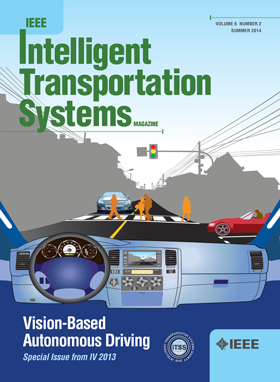DAG区块链辅助的自动驾驶异步联邦相互学习
IF 7.9
1区 工程技术
Q1 ENGINEERING, CIVIL
IEEE Transactions on Intelligent Transportation Systems
Pub Date : 2025-04-07
DOI:10.1109/TITS.2025.3552749
引用次数: 0
摘要
联邦学习(FL)作为一种分布式训练方法出现在车联网(IoVs)中,它通过交换模型而不是原始数据来促进联网和自动驾驶汽车(cav)训练全局模型,以保护数据隐私。在本文中,考虑到FL中模型精度和通信开销的限制,以及在实际场景中的进一步验证,我们提出了一个基于有向无环图(DAG)区块链的车联网系统,该系统由DAG层和CAV层组成,分别用于模型共享和训练。此外,引入DAG区块链辅助异步联邦相互学习(DAFML)算法,利用互蒸馏方法同时训练师生模型,提高模型精度。此外,策略网络将首先通过DAFML算法通过行为克隆进行专家数据增强策略的预训练,然后通过提出的基于近端策略优化(PPO)算法的自动驾驶框架进行再训练。仿真结果表明,本文提出的DAFML算法在模型精度、蒸馏比和自动驾驶决策方面都优于其他基准算法。本文章由计算机程序翻译,如有差异,请以英文原文为准。
DAG Blockchain-Assisted Asynchronous Federated Mutual Learning for Autonomous Driving
Federated learning (FL) emerges as a distributed training method in the Internet of Vehicles (IoVs), which promotes connected and automated vehicles (CAVs) to train a global model by exchanging models instead of raw data to protect data privacy. In this paper, consider the limitation of model accuracy and communication overhead in FL, as well as further verification in the real scenarios, we propose a directed acyclic graph (DAG) blockchain-based IoV system that comprises a DAG layer and a CAV layer for model sharing and training, respectively. Furthermore, a DAG blockchain-assisted asynchronous federated mutual learning (DAFML) algorithm is introduced to improve the model accuracy, which utilizes mutual distillation method to train a teacher-student model simultaneously. Moreover, a policy network will first be pre-trained by an expert data augmentation strategy through the DAFML algorithm via the behavior cloning, and be re-trained through the proposed proximal policy optimization (PPO) algorithm based autonomous driving framework. Finally, simulation results demonstrate that the proposed DAFML algorithm outperforms other benchmarks in terms of the model accuracy, distillation ratio and autonomous driving decision.
求助全文
通过发布文献求助,成功后即可免费获取论文全文。
去求助
来源期刊

IEEE Transactions on Intelligent Transportation Systems
工程技术-工程:电子与电气
CiteScore
14.80
自引率
12.90%
发文量
1872
审稿时长
7.5 months
期刊介绍:
The theoretical, experimental and operational aspects of electrical and electronics engineering and information technologies as applied to Intelligent Transportation Systems (ITS). Intelligent Transportation Systems are defined as those systems utilizing synergistic technologies and systems engineering concepts to develop and improve transportation systems of all kinds. The scope of this interdisciplinary activity includes the promotion, consolidation and coordination of ITS technical activities among IEEE entities, and providing a focus for cooperative activities, both internally and externally.
 求助内容:
求助内容: 应助结果提醒方式:
应助结果提醒方式:


